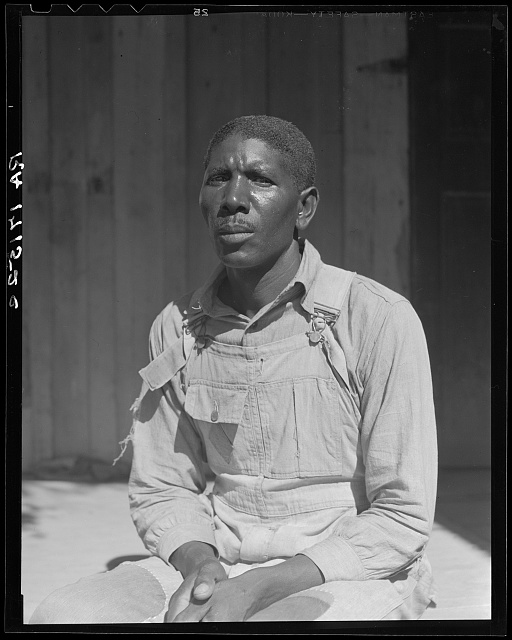A book by Clyde Adrian Woods2 explains this use of racial domination to destroy of Southern Black communities and shows how the established power of White supremacy attempted to portray this economic and social revolution as a beneficial transition from an inefficient labor-intensive mode of agriculture to a modern capital-efficient one based on a benign and progressive market economy.3
Another book by a man named Russell Lord gives the land-owner's point of view.4 He writes lyrically of the "triumph of the machine over the old cabin," of deliverance from "hand hoe and mule labor," of "economic salvation," and "an assurance of all the blessings of progress." He quotes the owner of the plantation, Joseph H. Aldridge, as saying "I got sick of trying to do business with one hand and play Santa Claus with the other. . . . I wish I knew how to make plain to you the way it gets to you, having that many people dependent on you yet not being able to deal with them in a direct, businesslike way."5
Here are some of the photographs that Dorothea Lange took at the Aldridge Plantation in June and July 1937. She took them as an employee of the Farm Security Administration and they are all found in collections of the Library of Congress Prints and Photos Division. Click to view full size. Captions are by LC staff from information provided with the negatives. Note that one of them quotes Aldridge himself, another quotes one of his workers, and others give some details about working conditions on the farm.











----------

----------
Notes:
1When one of the Aldridge Plantation photos appeared on the Shorpy blog, two commenters gave some information about the place:
a) Aldridge plantation2 Development arrested: the blues and plantation power in the Mississippi Delta, by Clyde Adrian Woods (Verso, 1998)
Submitted by Mims Aldridge on Sun, 06/29/2008 - 5:48pm.
Does anyone have any information on the Aldridge plantation outside of Drew, Mississippi? The original owner, Jack Aldridge, passed it on to his son Clem. After Clem died the property was taken over by Martha Aldridge. I am trying to get any information that I can about this property and its history.
b) Submitted by Bud on Thu, 03/26/2009 - 3:42pm.
I think the Aldridge Plantation worker picture here was near Leland, Mississippi. My family still owns land just south a couple of miles from here. There was another picture of old Joe Aldridge and some workers in the FSA pictures. There were several Aldridge family plantations in the area. One at Wilmot (Suitsme Plantation) and another at Estill. Both on Deer Creek but farther south. I don't know about the Drew Aldridges. It's a small world.
3 Here is a link to some extracts from the book by Clyde Adrian Woods
4 Men of earth, American farmers and the rise of agribusiness, by Russell Lord (Longmans, Green, London, 1931)
5 Here is a link to some extracts from the book by Russell Lord
6 The term riding boss carried over from the slave plantations; he was a mounted field foreman.
This image by another FSA photographer shows the riding boss on horse.

Additional sources on the riding boss:
- Cotton choppers with riding boss (NYPL Digital Gallery; image from The plantation South, 1934-1937, by William C. Holley, Ellen Winston, T. J. Woofter, Jr.
- Indignant heart: a Black worker's journal by Charles Denby (Wayne State University Press, 1989)
- The African-American as Sharecropper (pdf)




1 comment:
I don't know for sure, but I think this was my family's plantation. I don't have any of the family records anymore, and the Aldridge name was pretty common, so I could be wrong. My grandmother, Kitty Aldridge Cottingham, grew up on Suitsme plantation in Wilmont, MS, which is about 10 miles south of Leland, MS. She inherited the plantation from her father, though I'm not sure how far back the family has owned this land -- but most likely, they did own it in 1937 because that's around the time she was born. I don't know if her father's name was Joseph. She sold the plantation in 1999, and at that time, there were only a thousand acres left. Seeing this was incredible, albeit shocking. My grandmother talked little about the plantation, and never mentioned that there were sharecroppers or African American workers, though I suppose it makes sense for the time.
Caroline Cottingham
Post a Comment